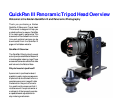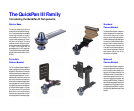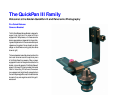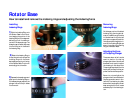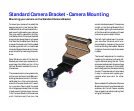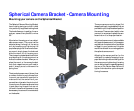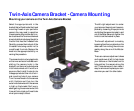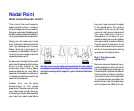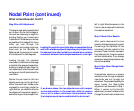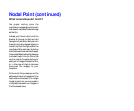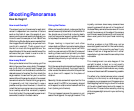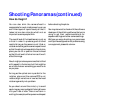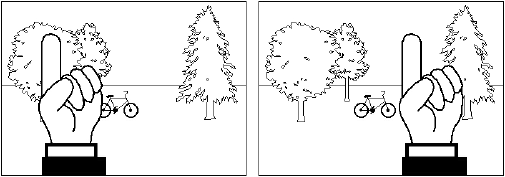
Nodal Point
This is one of the most frequently
asked questions when it comes to
stitcher-based panorama creation.
Once you understand the basics, you’ll
be able to easily locate the nodal point
for any camera and lens combination.
Simply put, the nodal point is the
point inside your camera where the
light rays converge and flip over.
When shooting a panorama it’s
necessary to rotate about this point
to eliminate the image mismatch
caused by parallax error.
It’s also worth noting that the nodal
point is not the same as the film plane,
which is often marked on the
underneath side of many 35mm
cameras. Generally, for most 35mm
cameras and lenses, the nodal point
is located somewhere towards the
center of the lens barrel.
Parallax error can be easily
demonstrated by this simple
experiment. Close one eye and hold
your index finger upright about six
inches away from your open eye. Rock
your head from side to side. Notice
how your finger moves with respect
to the background. This relative
movement is due to the fact that
you’re not rotating your head around
your eye’s nodal point, which is
somewhere in the center of your
eyeball. Instead, you’re rotating about
your spine which is several inches to
the rear and off to one side. It is this
relative side-to-side motion that we
will strive to eliminate when setting
up a camera for VR panoramas.
Step 1: The side-to-side
adjustment
Once your camera is fastened to your
camera bracket, move to the front of
the tripod head so you’re looking into
the lens. Adjust the camera bracket so
that the center of the lens is directly
over the pivot axis of the tripod head.
Try to be as accurate as possible. You
should strive to get this adjustment
within plus/minus a 1/16th of an inch.
What is it and how do I find it?
Parallax error can be easily demonstrated. It’s the relative
movement caused by a shifting point of view. In this example,
you eye is moving with respect to your hand and the back-
ground.




